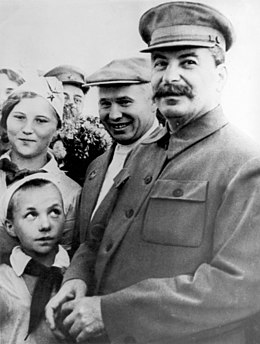Involvement in purges[edit]

Stalin's office records show meetings at which Khrushchev was present as early as 1932. The two increasingly built a good relationship. Khrushchev greatly admired the dictator and treasured informal meetings with him and invitations to Stalin's dacha, while Stalin felt warm affection for his young subordinate.[40] Beginning in 1934, Stalin began a campaign of political repression known as the Great Purge, during which millions of people were executed or sent to the Gulag. Central to this campaign were the Moscow Trials, a series of show trials of the purged top leaders of the party and the military. In 1936, as the trials proceeded, Khrushchev expressed his vehement support:
Everyone who rejoices in the successes achieved in our country, the victories of our party led by the great Stalin, will find only one word suitable for the mercenary, fascist dogs of the Trotskyite-Zinovievite gang. That word is execution.[41]
Khrushchev assisted in the purge of many friends and colleagues in Moscow oblast.[42] Of 38 top Party officials in Moscow city and province, 35 were killed[42]—the three survivors were transferred to other parts of the USSR.[43] Of the 146 Party secretaries of cities and districts outside Moscow city in the province, only 10 survived the purges.[42] In his memoirs, Khrushchev noted that almost everyone who worked with him was arrested.[44] By Party protocol, Khrushchev was required to approve these arrests, and did little or nothing to save his friends and colleagues.[45]
Party leaders were given numerical quotas of "enemies" to be turned in and arrested.[45] In June 1937, the Politburo set a quota of 35,000 enemies to be arrested in Moscow province; 5,000 of these were to be executed. In reply, Khrushchev asked that 2,000 wealthy peasants, or kulaks living in Moscow be killed in part fulfillment of the quota. In any event, only two weeks after receiving the Politburo order, Khrushchev was able to report to Stalin that 41,305 "criminal and kulak elements" had been arrested. Of the arrestees, according to Khrushchev, 8,500 deserved execution.[45]

Khrushchev had no reason to think himself immune from the purges, and in 1937, confessed his own 1923 dalliance with Trotskyism to Kaganovich, who, according to Khrushchev, "blanched" (for his protégé's sins could affect his own standing) and advised him to tell Stalin. The dictator took the confession in his stride, and, after initially advising Khrushchev to keep it quiet, suggested that Khrushchev tell his tale to the Moscow party conference. Khrushchev did so, to applause, and was immediately reelected to his post.[46] Khrushchev related in his memoirs that he was also denounced by an arrested colleague. Stalin told Khrushchev of the accusation personally, looking him in the eye and awaiting his response. Khrushchev speculated in his memoirs that had Stalin doubted his reaction, he would have been categorized as an enemy of the people then and there.[47] Nonetheless, Khrushchev became a candidate member of the Politburo on 14 January 1938 and a full member in March 1939.[48]
| External video | |
|---|---|
 Khrushchev speech in 1937 Khrushchev speech in 1937 |
In late 1937, Stalin appointed Khrushchev as head of the Communist Party in Ukraine, and Khrushchev duly left Moscow for Kyiv, again the Ukrainian capital, in January 1938.[49] Ukraine had been the site of extensive purges, with the murdered including professors in Stalino whom Khrushchev greatly respected. The high ranks of the Party were not immune; the Central Committee of Ukraine was so devastated that it could not convene a quorum. After Khrushchev's arrival, the pace of arrests accelerated.[50] All but one member of the Ukrainian Politburo Organizational Bureau and Secretariat were arrested. Almost all government officials and Red Army commanders were replaced.[51] During the first few months after Khrushchev's arrival, almost everyone arrested received the death penalty.[52]
Biographer William Taubman suggested that because Khrushchev was again unsuccessfully denounced while in Kyiv, he must have known that some of the denunciations were not true and that innocent people were suffering.[51] In 1939, Khrushchev addressed the Fourteenth Ukrainian Party Congress, saying "Comrades, we must unmask and relentlessly destroy all enemies of the people. But we must not allow a single honest Bolshevik to be harmed. We must conduct a struggle against slanderers."[51]